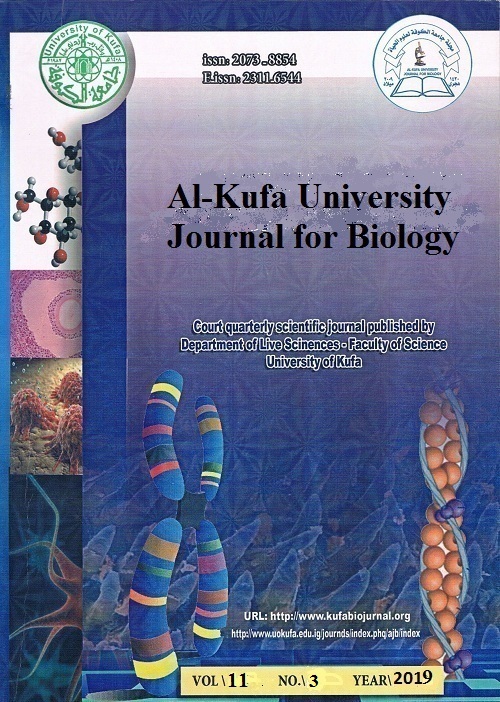p53, PTEN Tumor Suppressor Gene Methylation in Thyroid Cancer
DOI:
https://doi.org/10.36320/ajb/v11.i3.8153Keywords:
p53, PTEN Tumor, DNA methylation, Gene MethylationAbstract
Background and objective: DNA methylation serves as an alternative to the mutational inactivation due to epigenetic event that alters gene expression without changing its DNA sequence. Such alterations may silence putative DNA repair genes and tumor suppressor genes whose role is undisputed in malignant transformation. This study was performed to detect the frequency of p53 and PTEN methylation in different thyroid cancers.
Method: Using methylation specific PCR methods, DNA was extracted from 76 surgically resected thyroid tissues with primary cancer. The target (p53, PTEN tumor suppressor genes) DNA was amplified with the mutation-specific primers.
Results: p53 gene complete methylation and partial methylation were 13.2%, and 17.1% respectively, whereas PTEN complete methylation and partial methylation were 18.4% and 23.7% respectively. Complete p53 methylation was significantly frequent among Anaplastic thyroid cancer (ATC) cases (50.0%) compared with other thyroid cancer, followed by Follicular thyroid cancer (FTC) (33.3%). Papillary carcinoma cases were more likely to be unmethylated for p53 gene. Despite the trend of negatively associated PTEN complete methylation with any of the studied clinicopathological parameters, however, merging partial with complete methylation gave a significant association of PTEN methylation with FTC and, inversely, there was low link with Papillary thyroid cancer (PTC).
Conclusion: Combined silencing of PTEN and p53 faithfully reproduces the development of ATC, and may provide a compelling rationale for a future target chemotherapy. p53 methylation appears low among early staged (T1, T2 and N0) tumors may indicate that p53 silencing is a hallmark of advanced tumors and so has bad ominous sign. PTEN methylation is also significantly associated with follicular carcinoma whereas, inversely, low in papillary carcinoma.
Downloads
References
Antico Arciuch VG, Russo MA, Dima M, Kang KS, Dasrath F, Liao XH, et al. Thyrocyte-specific inactivation of p53 and Pten results in anaplastic thyroid carcinomas faithfully recapitulating human tumors. Oncotarget. 2011;2(12):1109-26.
Alvarez-Nunez F, Bussaglia E, Mauricio D, Ybarra J, Vilar M, Lerma E, et al. PTEN promoter methylation in sporadic thyroid carcinomas. Thyroid. 2006;16(1):17-23.
Mcfadden DG, Vernon A, Santiago PM, Martinez-mcfaline R, Bhutkar A, Crowley DM, et al. P53 constrains progression to anaplastic thyroid carcinoma in a Braf-mutant mouse model of papillary thyroid cancer. Proc Natl AcadSci U S A. 2014;111(16):1600-09.
Nikiforov YE, Nikiforova MN. Molecular genetics and diagnosis of thyroid cancer. Nat Rev Endocrinol. 2011; 7(10):569-80.
Gauchotte G, Philippe C, Lacomme S, Léotard B, Wissler MP, Allou L, et al. BRAF, p53 and SOX2 in anaplastic thyroid carcinoma: Evidence for multistep carcinogenesis. Pathology. 2011;43(5):447-52.
Alimonti A, Carracedo A, Clohessy JG, Trotman LC, Nardella C, Egia A, et al. Subtle variations in PTEN dose determine cancer susceptibility. Nat Genet. 2010;42(5):454-8.
Ricarte-Filho JC, Ryder M, Chitale DA, Rivera M, Heguy A, Ladanyi M et al. Mutational profile of advanced primary and metastatic radioactive iodine-refractory thyroid cancers reveals distinct pathogenetic roles for BRAF, PIK3CA, and AKT1. Cancer Res. 2009;69(11):4885–93.
Hou P, Ji M, Xing M. Association of PTEN gene methylation with genetic alterations in the phosphatidylinositol 3-kinase/AKT signaling pathway in thyroid tumors. Cancer. 2008;113(9):2440-7.
Quiros RM, Ding HG, Gattuso P, Prinz RA, Xu X. Evidence that one subset of anaplastic thyroid carcinomas are derived from papillary carcinomas due to BRAF and p53 mutations. Cancer. 2005;103(11): 2261-8.
Jones PA and Baylin SB. The epigenomics of cancer. Cell. 2007; 128(4):683-92.
Liu Y, Su L, and Xiao H. Review of Factors Related to the Thyroid Cancer Epidemic. Int J Endocrinol. 2017; 9-1.
Xiang J, Wang X, Wang Z, Wu Y, Li D, Shen Q, et al. Effect of different iodine concentrations on well-differentiated thyroid cancer cell behavior and its inner mechanism. Cell Biochem Biophys. 2015;71(1):299-305.
Rosai J. Thyroid gland in: Rosai and Ackerman's Surgical pathology. 10th ed. St louis: Mosby. 2010; 488-538.
Zuhdi SS, Salih AM, Mohammad ZA, Pity IS. MTHFR C677T polymorphism and thyroid cancer risk in Duhok, Kurdistan Region –Iraq. ZJPAS. 2018;30(1):85-94.
Salih AS, Naqshabandi MM, Hassan NA, Hadji DA, Pity IS, Al-Dohoky WM, Pity RS. BRAF gene mutation and CD56 immunoexpression in papillary thyroid carcinoma in Duhok-Iraq. JSMC, 2017;7(1):1-8.
Pity IS, Salih AM, Hassan NA. BRAFV600 gene mutation in thyroid cancer in Duhok-Iraq. Duhok Med J. 2015; 9(2):30-6.
Amatya VJ, Naumann U, Weller M, Ohgaki H. TP53 promoter methylation in human gliomas. ActaNeuropathol. 2005;110(2):178-84.
Agirre X, Vizmanos JL, Calasanz MJ, Garcı´a-Delgado M, Larra´yoz MJ, Novo FJ. Methylation of cpg dinucleotides and/or CCWGG motifs at the promoter of TP53 correlates with decreased gene expression in a subset of acute lymphoblastic leukemia patients. Oncogene. 2003;22(7):1070-72.
Khatami F, Larijani B, Heshmat R, Nasiri S, Saffar H, Shafiee G, et al. Promoter Methylation of Four Tumor Suppressor Genes in Human Papillary Thyroid Carcinoma. Iran J Pathol. 2019; 14(4): 290-8.
Lee JH, Kim Y, Choi JW, Kim YS. The association between papillary thyroid carcinoma and histologically proven Hashi¬moto’s thyroiditis: a meta-analysis. Eur J Endocrinol 2013; 168:343-9.
Smallridge RC, Marlow LA, Copland JA. Anaplastic thyroid cancer: molecular pathogenesis and emerging therapies. Endocr. Relat Cancer. 2009;16:17-44.
Wiseman SM, Griffith OL, Deen S, Rajput A, Masoudi H, Gilks B, et al. Identification of molecular markers altered during transformation of differentiated into anaplastic thyroid carcinoma. Arch Surg. 2007;142(8):717-27.
Hu S, Liu D, Tufano RP, Carson KA, Rosenbaum E, Cohen Y, et al. Association of aberrant methylation of tumor suppressor genes with tumor aggressiveness and BRAF Mutation in papillary thyroid cancer. Int J Cancer. 2006;119(10): 2322–9.
Waraya M, Yamashita K, Ema A, Katada N, Kikuchi S, Watanabe M. Exclusive Association of p53 Mutation with Super-High Methylation of Tumor Suppressor Genes in the p53 Pathway in a Unique Gastric Cancer Phenotype.2015: PLOS ONE/journal.pone. | DOI:10.13710139902.
Lim BH, Soong R, Grieu F, Robbins PD, House AK, Iacopetta BJ. p53 accumulation and mutation are prognostic indicators of poor survival in human gastric carcinoma. Int J Cancer. 1996; 69: 200–4. PMID: 8682588
Yamashita K, Upadhyay S, Osada M, Hoque MO, Xiao Y, Mori M et al. Pharmacologic unmasking of epigenetically silenced tumor suppressor genes in esophageal squamous cell carcinoma. Cancer Cell. 2002; 2: 485–95. PMID: 12498717.
Yamashita K, Kim MS, Park HL, Tokumaru Y, Osada M, Inoue H et al. HOP/OB1/NECC1 promoter DNA is frequently hypermethylated and involved in tumorigenic ability in esophageal squamous cell carcinoma. Mol Cancer Res. 2008; 6: 31–41.
Kubicka S, Claas C, Staab S, Kühnel F, Zender L, Trautwein C et al. p53 mutation pattern and expression of c-erbB2 and c-met in gastric cancer: relation to histological subtypes, Helicobacter pylori infection, and prognosis. Dig Dis Sci. 2002; 47(1):114–21.
Bataille F, Rümmele P, Dietmaier W, Gaag D, Klebl F, Reichle A et al. Alterations in p53 predict response to preoperative high dose chemotherapy in patients with gastric cancer. Mol Pathol. 2003; 56(5):286–92. PMID: 14514923
Adrian Jarzynski, Katarzyna Papiernik, Malgorzata Polz-Dacewicz. Analysis of mutation and promoter methylation of TP53 gene in tumors of the head and neck. Curr. Issues Pharm. Med. Sci. 2016; 29(2):53-6.
Beg S, Siraj AK, Jehan Z, Prabakaran S, Al-Sobhi SS, Al-Dawish M, et al. PTEN loss is associated with follicular variant of Middle Eastern papillary thyroid carcinoma. Br J Cancer. 2015;112(12):1938-43.
Frisk T, Foukakis T, Dwight T, Lundberg J, Höög A, Wallin G, et al. Silencing of the PTEN tumor-suppressor gene in anaplastic thyroid cancer. Genes Chromosomes Cancer. 2002;35(1):74–80.
Landa I, Ibrahimpasic T, Boucai L, Sinha R, Knauf JA, Shah RH, et al. Genomic and transcriptomic hallmarks of poorly differentiated and anaplastic thyroid cancers. J Clin Invest. 2016; 126(3):1052-66.
Latteyer S, Tiedje V, König K, Moeller LC, Targeted next-generation sequencing for TP53, RAS, BRAF, ALK and NF1 mutations in anaplastic thyroid cancer. Endocrine. 2016;54(3):733-41.
Downloads
Published
How to Cite
Issue
Section
License
Copyright (c) 2019 GHAZWAN FAWZI AHMED, INTISAR SALIM PITY, AHMAD MUHAMMAD

This work is licensed under a Creative Commons Attribution 4.0 International License.
which allows users to copy, create extracts, abstracts, and new works from the Article, alter and revise the Article, and make commercial use of the Article (including reuse and/or resale of the Article by commercial entities), provided the user gives appropriate credit (with a link to the formal publication through the relevant DOI), provides a link to the license, indicates if changes were made and the licensor is not represented as endorsing the use made of the work.












